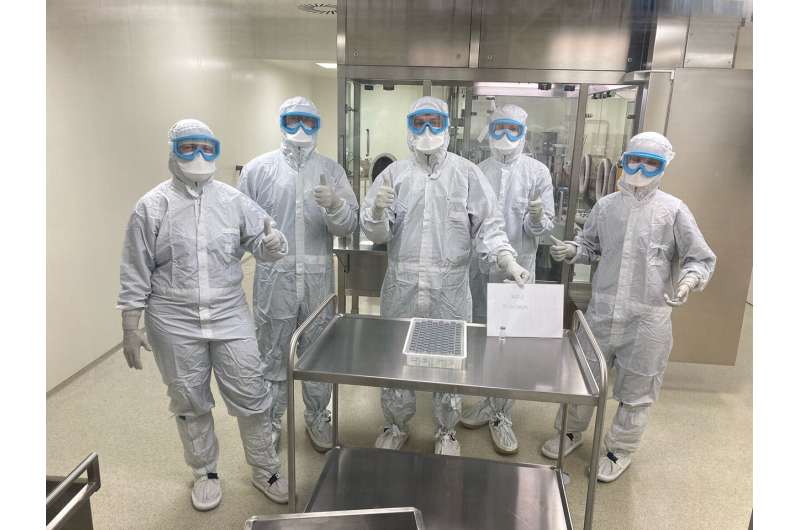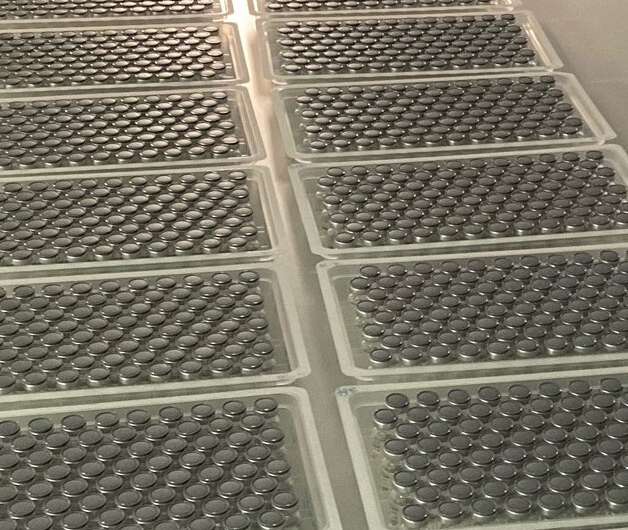Top-speed antibody development

The development of biopharmaceuticals is a long and expensive process. A decade or more can elapse between the discovery of a new protein-based active ingredient and the release of a new drug. One major hurdle on this journey is the passage from the lab to clinical trials. As a rule, it takes between 18 months and two years to produce this kind of investigational medicinal product for use in clinical trials. However, at the Fraunhofer Institute for Toxicology and Experimental Medicine ITEM, researchers from the Division of Pharmaceutical Biotechnology have now developed a production method that reduces this step to just six months.
Around the world, research into therapeutic drugs and vaccines to combat the coronavirus has been intensified dramatically in recent months. The pandemic has underlined, once again, just how vital it is to speed up the development and release of new drugs. Yet reality paints a different picture. The development of a suitable bioprocess and the pilot production for a protein-based drug candidate can take anything between 18 months and two years. Only then can clinical development begin—a complex process comprising three phases. Many of the candidates are eliminated in the first or second phase of the clinical studies due to low tolerability or lack of efficacy. It is therefore of the utmost importance to obtain these clinical results as quickly as possible. Researchers from the Division of Pharmaceutical Biotechnology at Fraunhofer ITEM have now been able to significantly accelerate the process from the discovery of a new mechanism of action to the preparation of a new investigational medicinal product ready for clinical trials. "Our new fast-track method cuts many months off the time required for process development—instead of 18 months to two years, the entire development process, including pilot production, now takes only six months," explains Prof. Holger Ziehr, director of the Division of Pharmaceutical Biotechnology at Fraunhofer ITEM in Braunschweig. This benefits the pharmaceutical industry and patients alike. The new fast-track approach to bioprocess engineering was born of necessity, in response to the COVID-19 pandemic. "We developed this new method in close cooperation with a partner from industry," Ziehr says. "It's enabled us to reduce the time it takes to produce an antibody for clinical trials to one-third of what is normally required. Antibodies are proteins produced by immune cells. These proteins bind to pathogens and trigger mechanisms that destroy them. As a therapeutic, they support the immune system."
Development of a strategy in consultation with the Paul-Ehrlich-Institut
Synthesized antibodies can alleviate chronic inflammation and help in the treatment of neurodegenerative diseases and cancer. The researchers are therefore optimistic that biotechnologically produced antibodies can be used in the treatment of COVID-19. "Anyone looking to develop a human antibody for treating SARS-CoV-2 is very much in a race against time," Ziehr explains. "A period of 18 months to two years is simply too long. That was what led us to opt for a different production strategy, so that suitable candidates for a new active substance can progress to clinical studies much more quickly." To place the strategy on a firm footing, this new approach was first submitted to Germany's national vaccine approval body, the Paul-Ehrlich-Institut.
Like most other antibody production processes, the process developed at Fraunhofer ITEM is based on Chinese hamster ovary (CHO) cells. Around 80 percent of all biotechnologically produced pharmaceutical-grade proteins are produced with the help of this cell line. One of the principal reasons for this is that the sugar chains, which in the CHO cells are attached to a newly synthesized protein, are similar to those of humans.

A cell factory for antibody production
Just how did researchers manage to develop a candidate for a new active ingredient in such a short time? In order to produce antibodies, the genetic material from this antibody—i.e., its DNA, which contains the corresponding antibody gene—must be introduced into CHO cells. "For this, we use so-called plasmids," says Ziehr. "These are ring-shaped DNA molecules, which are introduced into the CHO cells by means of a process known as transfection." This process of transfection takes place in a vessel containing a few milliliters of a liquid nutrient and millions of cells. The plasmids are then added to this culture, where they penetrate the cells and then randomly integrate into the chromosome. The composition of the liquid nutrients ensures that only those cells multiply that have incorporated the antibody gene. In the conventional approach, the tedious next step is to isolate and test individual cells until a CHO cell clone displaying optimal integration of the antibody gene within its genome is identified.
This is an extremely time-consuming process, since it can take as long as 48 hours for a single cell division. "This means that a year can easily pass before a usable clone is available. That's far too long, especially if the aim is to develop a drug for COVID-19. We therefore opted to dispense with the lengthy process of cell isolation and work directly with the cell pool from transfection. This meant accepting the risk that some of the cells would have incorporated the genetic information from the antibody much more successfully than others. However, the selection conditions applied to the cell pool were such that the cells that produced the most antibodies were also the ones that grew best. Some cells produced more antibodies, others somewhat fewer, but all of them produced the same antibody."
New business model
That risk paid off. The result is a stable cell pool that grows well and produces, as a whole, a large amount of antibodies. In just six months, researchers were able to harvest a large quantity of pharmaceutical-grade monoclonal antibodies using this method and prepare 3500 doses for clinical trials. Furthermore, this fast-track process can be used for almost any kind of pharmaceutical-grade protein. It has therefore created a completely new business model in the field of pharmaceutical biotechnology for Fraunhofer ITEM.




















